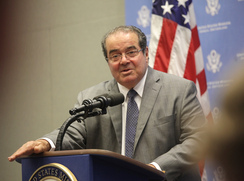| | crime scene. That was hardly conclusive evidence. Unless the culprit had grotesquely large or tiny feet, a footprint could belong to any of countless people. But it was a tool to help narrow the focus. They did not, however, take those shoes and apply them to a database of other crimes committed by similar-sized feet. Then came fingerprinting, which provides much more conclusive evidence. These have long been admissible in trials, and police can compel suspects to have their fingerprints recorded and documented without violating any constitutional rights. “Under the Fifth Amendment to the U.S. Constitution, no person may be compelled to be a compulsory witness against himself or herself. However, this provision generally applies only to involuntary confessions and forced testimony. A person suspected of a crime does not have the right to be free from the taking of fingerprints. Criminal suspects may also be required to surrender other personal information, such as physical appearance and measurements, handwriting and voice samples, teeth bites, normal walking gait, and normal standing posture. Unlike most of these characteristics, fingerprints cannot be easily changed.” So says the free online legal dictionary (read it here). So when the U.S. Supreme Court ruled this week that it is permissible to take a DNA sample from suspects, that was just the next logical step in the progression of physical evidence that could be collected in connection with crime-solving, right? Well, one might have thought so. Instead, while the court held that the practice was legal, the ruling came as a 5-4 decision that presented an odd divide among the liberal and conservative justices. (Read the ruling by clicking here.) Conservative Justice Antonin Scalia wrote a scathing dissent. He said the taking of a DNA sample is not at all the same as requiring suspects to have fingerprints recorded. “Fingerprints of arrestees are taken primarily to identify them (though that process sometimes solves crimes); the DNA of arrestees is taken to solve crimes (and nothing else),” he wrote, adding “…Solving unsolved crimes is a noble objective, but it occupies a lower place in the American pantheon of noble objectives than the protection of our people from suspicionless law-enforcement searches. The Fourth Amendment must prevail.” Later, he wrote, “Today’s judgment will, to be sure, have the beneficial effect of solving more crimes; then again, so would the taking of DNA samples from anyone who flies on an airplane (surely the Transportation Security Administration needs to know the ‘identity’ of the flying public), applies for a driver’s license, or attends a public school. Perhaps the construction of such a genetic panopticon is wise. But I doubt that the proud men who wrote the charter of our liberties would have been so eager to open their mouths for royal inspection.” Many people probably won’t think twice about this case. After all, a DNA sample could do as much to exonerate a falsely accused person as it might do to convince someone. Scalia can be a bit overwrought, at times, but his point about warrantless searches is worth pondering. Where do we draw the line on the personal information, the constant surveillance and the accumulation of data? And if we don’t draw a line, hasn’t the state at some point removed too much liberty in the name of safety? And couldn’t this store of information be used in ways we come to regret? |
|
0 Comments
Your comment will be posted after it is approved.
Leave a Reply. |
Search this siteLike what you read here? Please subscribe below, and we'll let you know when there is a new opinion.
The author
Jay Evensen is the Senior Editorial Columnist of the Deseret News. He has nearly 40 years experience as a reporter, editor and editorial writer in Oklahoma, New York City, Las Vegas and Salt Lake City. He also has been an adjunct journalism professor at Brigham Young and Weber State universities. Archives
November 2023
Categories
All
Links
|


 RSS Feed
RSS Feed

